#the spotlight effect
Explore tagged Tumblr posts
Text



the fear of being perceived (the spotlight effect)
The spotlight effect is a term social psychologists use to refer to the tendency to overestimate how much other people notice about us. In other words, we tend to think there is a spotlight on us at all times, highlighting our mistakes or flaws for all the world to see.
I've struggled with social anxiety for much of my life, and while it's something I'm still working on, I decided to write on it. For as long as I can remember, I've been consumed with thoughts about what others might think of me—about how I looked, how I acted, even how I stood or moved (fear of judgment). I avoided doing certain things because I didn’t want anyone trying to get ideas about who I really was (fear of vulnerability). I would often judge myself before others could, and I still do this at times & if someone else accomplished something, I'd see its value, but if it were me, I’d brush it off as “something I should have known anyway” (perfectionism and self-criticism). I notice things others around me don’t—especially about myself—such as how I’m coming across, how I think others will react to what I do or say, and then replaying interactions in my head (overactive self-awareness). This constant worry was rooted in my childhood, in an environment that felt harshly judgmental. I saw people being criticized for the smallest things, and I never wanted to be on the receiving end of that even though I did. A lot.
So, I chose to blend in, to become a wallflower. I avoided speaking up and kept to the background, staying clear of loud or critical people. And if I couldn't avoid them, I did my best to please them to keep the peace. Though, I remember wanting to be like people who freely expressed themselves with minimal fear of being judged, and i longed to be like them.
So let's be real: we all want to be liked, loved, and perceived in a certain way. We all aspire to be that person—whether it's for ourselves or for others. When we don’t feel like we measure up, it can leave us upset, angry, or even depressed, often leading us to blame those around us.
The question is: what is your perception of yourself? How do you see yourself? What do you think of yourself?
Often, we may not like the answers, and that’s where the frustration sets in. This 'wallflower' space I've confined myself to is limiting. Activities I once enjoyed faded away due to my fear of judgment, and I struggled to find new interests. I started thinking, "This is so-and-so's fault. If they weren't selfish, judgmental, and focused on others' shortcomings because they disliked their own, I wouldn’t be like this." So yes, as a child, I definitely assigned blame, and a part of me still does, to be honest. But I know it’s my responsibility to become the person I want to be.



So, I decided to reinvent myself.
Yet, I faced numerous setbacks. There were times I forgot my goals, allowing my anger toward others to grow until I wanted to leave everyone behind.
Who was I really mad at?
Who am I mad at?
Who was the one actually thinking and saying these negative things about me?
me.
Otherwise, I just assumed that's what everyone else thought based on some bad experiences but I was the one who repeated these things over and over about myself. And more than half of the time, no one cared that much.

"An example of the spotlight effect can occur in everyday situations, like when you accidentally trip or stumble while walking in public. In that moment, you might feel like everyone around you is watching and judging you for your clumsiness. You may worry that people are laughing at you or thinking less of you. However, most onlookers are likely focused on their own activities and don’t even register what happened.
Once the moment passes, it’s likely that they won’t remember it at all. This experience highlights how we often overestimate the attention and scrutiny we receive from others, leading to unnecessary embarrassment or anxiety."
And honestly, no one cares, no one is looking at them like that. It’s all in their head. I wouldn't really give them a second thought if I even give them the first. But sometimes when I’m the subject of the situation, I don't see that. When I'm in a similar situation, I think just like them.
The truth is, I denied myself new experiences, standards, and boundaries. I’m the one who struggles to say no. I fear making friends out of concern for being taken advantage of. I accepted the labels that were placed on me.
"You're used to limiting yourself because the comfort that comes from blaming other people for your lack of dedication is easier than admitting that you have personal responsibility, and that the reason that you haven't done it is because you don't want to." - get over your fear of being seen (spotlight effect)
I had become too comfortable in this inferiority complex I created; it felt safe in the familiar, but I was scared to fail or disappoint others—or worse, myself. I didn’t know what I wanted in life, so I stayed put. Eventually, I realized I didn’t want to live like this forever. I didn’t find joy in it, and I never would. Slowly, I began to recognize my own value.



How I got here:
Acknowledging my strengths & accomplishments - by recognizing my achievements up until this point, helped me appreciate the effort I’ve put in and the skills I bring to the table, boosting my self-image. It’s a powerful reminder that I’m more capable than I realize.
Challenging negative self-talk - actively questioning and reframing unkind or self-critical thoughts. This practice helps break the cycle of negativity and encourages a more balanced, realistic view of yourself. Over time, this shift boosted my positivity and builds self-confidence, allowing me to approach more challenges with a stronger sense of self-assurance.
Practice self-compassion - treat myself with kindness and understanding, especially during tough times. Accepting that imperfections and mistakes are part of being human. Nurturing self-compassion strengthened my emotional resilience and fosters a healthier relationship with myself.
Set realistic goals and celebrate every success, no matter how big or small - recognizing your progress helps keep me motivated and boosts your confidence. So whether I tackled a big event or just managed to get through a challenging day, I take a moment to acknowledge those wins. Every step forward matters.
Seek out a support system - Connecting with people who uplift and encourage me, whether it’s friends, family, or a community group. Having a solid support network can make a significant difference. They can provide valuable advice, share their experiences, and help keep you motivated. Remember, you don’t have to face challenges alone—having others by your side can really enhance your journey!
To anyone who feels trapped in their own 'wallflower' existence: know that you are not alone. It’s okay to take your time in this journey. Change doesn’t happen overnight, but each step forward brings you closer to the person you want to be. Baby steps got me to the point I am today. I am way more open, way more confident, have more faith and belief in myself, I truly believe people who have any sort of relationship with me are lucky & all my imperfections contribute to my perfection, and I found the confidence to write and release this post. I’m now at a point of my life that if I insult myself, I feel really offended like why would I say that about myself?
Looking ahead, I aspire to keep growing, to continue shedding the labels that no longer serve me.

masterlist
#cherubofthenight#divider by fairytopea#divider by thetaey#loa#affirmations#loa success#hypergamy#law of assumption#loassumption#femininity#divine feminine energy#self worth#self awareness#self care#im just a girl#it girl#girlhood#black girl#dream girl#girlblogging#girly tumblr#just girly posts#the spotlight effect#inferiority complex#spotlight effect
19 notes
·
View notes
Text
oh. my. gosh. this got better as I scrolled. because what first felt like a reference to the beginning of the story turned into it's own story.
wow.
I am fond of these things where the shadows reveal that which is hidden and boiii does this do it for me.
the choice of lighting, where it's coming from the TV, from the match, from the event that kickstarted the whole thing and led to a legend
the use of light too like, the way it...quite literally shines a light on shoyou and enlightens him, or inspires him
and the next genius thing? the shadow takes up noticeably more of the piece, it's the "larger half". it's larger than half. and the way little shoyo isn't looking at it, he isn't aware of it there. the way he becomes greater than that which inspired him (in the realm of volleyball at the very least)
then it's the lack of focus that is implied with the bike, and the soccer ball vs the shadow where everything, every detail all is stripped away so that it's nothing more than the silhouette of a spiker. It doesn't matter what brand ball, what team, what shoes, what details: no all that matters is the singular focus on the ball. contrasted with younger shoyo and all the details.
speaking of details: I really enjoy the way he's stopped, it's got a very lackadaisical feel, but not completely, because one leg is straight. the straight leg doubles as both an arrow to guide us down to the shadow to reveal the story, but also with the way it's straight and the foot isn't on the ground, but rather tilted upwards kinda feels excited
oh this was lovely
a very good hook to the gut.
excellent
thank you artist

"what will you become tomorrow?"
#pretty art#lovely#hinata shoyo#visual story telling in one frame#the lighting folks#the spotlight effect#and then the shadow#scrolling I was like: oh it's a baby shoyo drawing or something#then I scrolled down#then I scrolled down...#and saw the very fun story telling of this piece#it was an experience#thank you for the experience artist
5K notes
·
View notes
Text


Spotlighting another campaign this week.
@mahmoudkhalafff reached out to me on my personal blog to spread awareness for his fundraiser to get his eight family members out of Gaza. The need €30,000 and their fundraiser is currently at €24,590 as of August 23.
They are #151 on nabulsi and el-shab-hussein's Vetted Evacuation Fundraiser spreadsheet.
There's only €5,410 left to raise, let's get them there!
#my art#trying to figure out if creating illustrations like this to spotlight a fundraiser is more effective or less than the requests last week
2K notes
·
View notes
Text

what the classics teach us:
you don't put brothers in a story and expect them both to make it out alive.
you cannot save your son.
you will have to kill your son.
the story is salvation for the ones in the wings.
the guilt will damn them to fall anyway.
#ghostart#supernatural#sam winchester#dean winchester#i was really happy with the lines in this but sadly the blur effect REALLY makes the spotlight look better. so. (lights cigar)
100 notes
·
View notes
Text

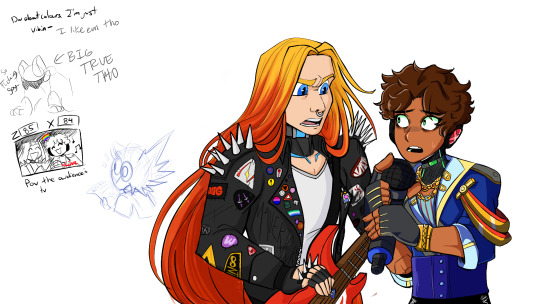
Megaman Spotlight Au that @skywing206 and I drew on magma. Will I explain it? Mayhaps
#megaman x#megaman x au#Megaman x Spotlight au#is gonna be real gay and real tragic in this#actually was inspired by ink's punk zero and it set off a domino effect#megaman x spotlight
94 notes
·
View notes
Text
Birthday Spotlight - Crielle ferch Fnwy

[18 April - Aries]
Crielle ferch Fnwy is the matriarch of the An Fnwy estate, a beautiful, evil Machiavellian supervillain who has been manipulating the Seelie Court and her family for tens of thousands of years, while giving the appearance of being a perfectly loving Seelie fae who only cares about truth and justice.
Mother of Gwyn ap Nudd, and aunt of Efnisien ap Wledig, Crielle is actually only rarely seen in stories, but has an explosive impact regardless, due to the trauma she inflicts or causes others to inflict on our main characters.

‘You’re not mine. You may have stolen from our family legacy, you may have parasitised our reputation, you may have even exploited and ruined the things about our appearance that make us – not you – beautiful. But you are not, you have never been mine. If you felt a short, sharp shock when you came into the world, my darling, it was my hands around your throat while your father tried to pull me off you. ‘Imagine, if you will, my dear, reprehensible thing. Imagine the first time you came back to me after we sent you away to play with Efnisien. Oh you were only twelve or thirteen? What a lovely idea that was. And Efnisien had you for hours. I told him to use knives. He liked them so, and he didn’t think he’d be allowed. So precious. And I heard the distant echo of your screams like a faint, familiar melody all throughout my day. A time when they stopped because he gagged you perhaps? Or your voice gave out? Tsk. He is – was – so crude. But still...effective. And do you remember? Oh, my creature, imagine it... ‘You came home hours later, hours after Efnisien. You were broken and cut and bleeding and so, so ruined. And you stumbled into the house, and there I was waiting for you. Breathless, actually. And you stared at me as though I would – what? – tell you that Efnisien had crossed a line, gone too far? Do you remember what I did?’ ‘You smiled at me,’ Gwyn said, his voice rough and rusty.
Game Theory

Game Theory: Introduced as the manipulative, evil, and cruel mother of the King, Crielle starts off with Cinderella stepmother vibes, until you realise that Gwyn's her only son and she can't stand him, favouring his cousin Efnisien instead. A torturer, abuser, schemer, and conniving Machiavellian figure, she ultimately has been puppeting the Seelie Court for thousands of years, and is the cause of Gwyn attaining, and then losing, his Kingship.

It's safe to say that Crielle has never been the Most Valued Player of any story.

The Court of Five Thrones: While Crielle only has a very brief appearance in this story, her presence is felt throughout. We find out more about her feelings towards Gwyn, through journals he discovers in her house after her murder at Augus' hands.
The Drawn Bead: In a story that explores Gwyn's first love, Crielle is there as a forbidding, tormenting figure, ruling Gwyn's life with an invisible, oppressive kind of terror.
The Curse: The only story which features Crielle's perspective, we see her as a child, a teenager, an adult, and learn about her dangerous proclivities, how her family did and didn't deal with them, and the depth of her love for a select few people, a love that she gave to Gwyn right up until the moment he was born.
Fae Tales – Alternative Perspectives: Crielle is only here briefly, but we see more of her dialogue with Gwyn, and more of Augus' perspective about her.
Underline the Black: Crielle here emerges as a cruel villain to Efnisien, in a flipped/reversed narrative where Gwyn is her beloved child, and Efnisien is nothing more than a neglected science experiment. Efnisien's life is at the mercy of Crielle's whims, and she puts him first in Hillview (an institution) to put him out of sight and out of mind, but as soon as he causes too much trouble for her, she won't hesitate to strike him down.
The Spoils of the Spoiled: In which Crielle even in the human world as a human herself proves that she can be just as evil as ever. Ruler of the household, torturer of Gwyn (and later, we learn, Efnisien), and clearly involved in corruption and organised crime, Crielle lives her best life in this story until Gwyn tries to legally emancipate himself from the family.
Falling Falling Stars: In the follow up to The Spoils of the Spoiled, Efnisien - previously thought of as the beloved and protected 'adopted' child of Crielle's - reveals over time the verbal, emotional, physical, and sexual abuse he suffered at her hands through therapy sessions with Dr Gary. Over time, we realise that no one is safe from her influence.

Crielle is very 'classically' beautiful, with blonde hair that has a slight wave in it, that generally falls down to her shoulders. She has azure eyes, a shade of blue almost never found among humans (even when she's human). She wears only enough make-up to accentuate her eyes and perfect lips, and maintains a very 'natural' effect to her beauty. It looks effortless and perfect enough that many who are experienced with beauty routines know she puts a lot of time into her appearance.
Crielle is asexual, sex repulsed, and aromantic.
Crielle is common fae, and while she's affected by the curse that Olphix cast upon the family, I like to think she'd still be pretty awful.
Born into a family in which some members are predisposed to sociopathic behaviour, Crielle was one of the worst and was not encouraged by her parents to be the way she is. Many people assume that she was abused into her evilness, but she wasn't.
To me, the concept or alienness of someone who is as evil as Crielle simply because she was 'born that way' is very fascinating to me.
Incredibly intelligent and perceptive, her few weaknesses are around the (few) people she loves and the way she will indulge them, as well as anything that threatens her reputation.

In Game Theory, when we finally realise that she is at the centre of Gwyn's devotion, standing there watching his humiliation, reacting in disgust to being called 'Mama' in a moment of vulnerability from her own son.
In Falling Falling Stars, Efnisien calls Crielle, and it becomes quickly clear that she holds no love in her heart for Efnisien when she calls him a 'ghost' and reminds him that ghosts are very easy to kill, making it clear she still wants him dead, and only inertia/disinterest is keeping her from following through because she'd already killed him once.

Always really fucking evil and irredeemable.
Frankly dies a lot.
Always a bit of a mad chemist. In Fae Tales she is a literal chemist and inventor of many different poisons. This has carried over even in to her human incarnations where in the Spoils universe she uses her knowledge of science to cultivate, create, or acquire poisons and viruses and bacteria to insert into Gwyn's food. And carries even more strongly into the Underline universe, where she runs one of the most successful synthetic hormone companies in Australia.
Visibly stunning.
Cares a great deal about reputation.
Usually loves Efnisien. Underline is the first series that has flipped the narrative so that Gwyn is beloved and Efnisien is loathed.
Kind of disdains her husband, who has no power over her.

Crielle is a real figure in Welsh mythology, though she was never meant to be an evil figure. Nor is she Gwyn's mother in the mythology. A sign of just how intensely I've bastardised everything for my own purposes.
She is good friends with the Ratcatcher of Hameln.
I wanted Crielle to be an example of how you can't expect that someone perfectly beautiful is a good person. I also really wanted to write a woman villain. I felt like a lot of woman villains at the time that I was seeing or reading were often written as petty or just in ways that made them somehow 'weak.' The appeal of Crielle is that she's an extremely effective villain and the only thing that stops her is her death (with the exception of Falling Falling Stars).
Despite how awful she is, I really love her! I'd write her more, but she's too strong and powerful lmao and she ruins my character's lives too much.
Crielle's colours for me have always been cream, yellow, white and blue. It's hard to imagine her wearing anything else.

‘How perfectly disgusting,’ Crielle purred. ‘A little worm has learned how to use the phone. I thought I had a caterpillar once, that would turn into the most beautiful butterfly, but it turns out the only thing my sister’s loins are good for, are despicable little worms.’ ‘D-Do you hate me now?’ Efnisien whispered. Crielle laughed lightly. ‘Oh, oh, my darling, I don’t hate you.’ A moment of hope, strong and bright, a sudden dawn inside of him. ‘I feel nothing for you. As far as I recall, I killed my nephew, and you are nothing more than a ghost.’
Falling Falling Stars
#birthday spotlight#crielle ferch fnwy#falling falling stars#fae tales verse#fae tales#fantasy#original writing#original work#writing villains#fantasy writing#i love crielle so much honestly#she's the worst#i don't love her in a 'she's great i want to spend time with her' way#but in a 'she's such a robust#and strong and effective villain' kind of way#i can always trust that she will thoroughly fuck shit up in any scene she appears in#and also frequently posthumously as well
30 notes
·
View notes
Text
Playful Land— Theories and Rambling.
I'm ab to sound so insane but I genuinely believe that Fellow Honest and Giddell's relationship is meant to parallel Leona Kingscholar and his relationship with Cheka (as well as general siblingisms with the Tweels, Ace's brother possibly making an appearance)
I'm just saying, it makes sense that the first translation of Honest's first name is Pharaoh (from what I'd seen before they corrected but still...) not only that but the themes of Pleasure island being about how the Amusement park encouraged young boys to indulge in misbehaving with the caveat being they'd be turned into donkeys (jackasses) and thus were forced into labor. Making him a Pharoah in that sense.
But I also notice that since his name is actually Fellow, it would mean that he's playing the role of a fellow man who simply wants to "help" others.
I wonder if Fellow Honest is possibly doing the same by funneling misbehaving people as a means to teach them a lesson? Or possibly controlling people as a means to elevate himself? (A combo of Ruggie and Leona mayhap?)
I also want to get into the parting words of "Don't lose your conscience." Conscience being a determiner for your morals and inner voice—something Lampwick and the other boys lose by indulging in rough housing, smoking and other bad behaviours.
Going off the crew being controlled and thus having their villainous traits amplified so that they'd become "donkeys" (Or whatever happens to those who succumb in this event). I'm assuming Giddell or Fellow Honest have a Unique Magic that works like a combo of Ruggie and Jamil—being able to alter one's mind long enough to permanently change them while the other has a Unique Magic to transform/bless someone by turning them into an animals/puppets.
#twst#twisted wonderland#twst theory#ace trappola#leona kingscholar#lilia vanrouge#honestly just rambling to get my thoughts out#but its kinda interesting how Ace has the spotlight#almost like hes pretending to be under the effects#also Jade being there means too much to me actually#because Jade's Unique Magic deals with the truth at the expense of the person being unguarded#Fellow Honest seems like an open book but difficult to decipher#so Jade's UM could misfire#Kalim being there because of that one Pinocchio scene where he has to save Geppeto from the whale that swallowed him....
56 notes
·
View notes
Text
head in hands like "maybe i should have realized this about myself sooner" as i am surrounded by neon flashing signs that Very Clearly Indicate the thing i should have realized about myself sooner
#anyway i'm just mulling about the 'tism skdjfhgljhdfg#thinking about how i've been having a hard time on site with my internship because i struggle to make small talk with my superiors#and everything is uncomfortable and terrible all of the time and i feel so so out of my depth#but talking with my university superior about the methodology of our profession#has me feeling like i'm playing just dance on extreme and i'm nailing every single beat w#like quite literally is like one of those rhythm games where when you get a combo it plays a cool sound effect#and i'm playing so well the sound effects are overlapping and the screen is just an explosion of stars w#so yeah i am. very comfortable talking academics and theory and things but. shit in social situations.#when i don't have that to rely on whoops#anyway it's just another thing on the incredibly long list of things i have building in my mind of#'why i should have realized i'm probably on the spectrum sooner'#the thrilling sequel to 'how did i go 20+ years without realizing i have ADHD' w#(speaking of)#(the way my ADHD has been leaping into the spotlight this week)#(biggest highlight was being jumpscared not once)#(not twice!!)#(but THREE times by food i had bought for myself)#(put down briefly)#(and then forgotten about for upwards of 30 minutes to 5 hours)#(like the other day i bought myself a little pastry on the way home as a congrats for surviving another week)#(and i put it on the table when i came inside)#(but i. forgot i did that. and went like 4 hours without even thinking about it)#(until i got up and left my room and saw the bag and went '! ! ! ! ! ! ! OH MY GO D MY PASTRY NOOOOOOO')#(the adhd and the autism . . . . they are attacking my ass . . . . . )
31 notes
·
View notes
Photo




horizon forbidden west | kotallo 4/?
#horizon forbidden west#hfw#kotallo#scorcher#i love catching him in action in this quest#also his combat dialogue XD#i wish guerrilla would turn down his character spotlight thingy at night#but it does lead to some cool lighting effects...#hfw npcs#hfw scorcher
127 notes
·
View notes
Text

and the grass where you lay left a bed in your shape / I looked over it and I ached
Dean Winchester has spent his whole life cleaning up his father's messes. Now that his little brother, Sam, is settled in California and Bobby's got a handle on the garage, they convinced Dean to finally do something for himself. After a chance encounter at the Air Force recruitment fair Sam dragged him to, Dean got hooked on air traffic control, and he gets stationed at Kansas City Tower for his final leg of training. There, he has to impress his on-job instructor Castiel Novak, the ex-Air Force captain who piqued his interest in ATC in the first place. (And only in ATC. He swears. Those blue eyes and dark hair and stupid hat have nothing to do with it.) If all that wasn't hard enough, just one week into his OJT, Dean gets a call telling him his father is dying and has to move back home to live out his final days—which could be more like years.
Dean has to decide whether to continue to let his life be defined by his father's mistakes and his misguided obligation to everyone else, or if he's brave enough—and strong enough—to find a life in his own shape.
start reading now on ao3!
#new chapter coming out tomorrow!!!!!!!#supernatural#spn#spn fanfic#destiel fanfic#ao3 fanfic#read on ao3#a life in your shape fic#dean winchester#castiel#john winchester hate club#bobby best dad singer#fanfic#fanfiction#mine.fic#it's got planes! and nerdy end notes from me about why they use paper strips but also ipads!#this one's got a lot of the effects of john's childhood abuse of dean so just mind the tags and all that#but it's more about recovering from it than spotlighting it. or i hope so.
33 notes
·
View notes
Text


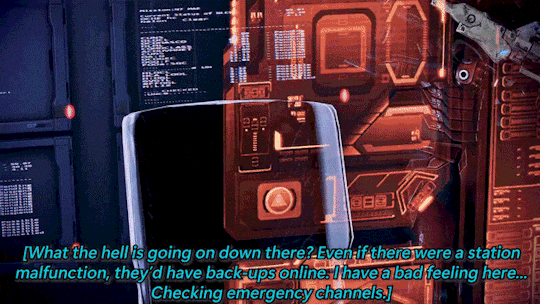









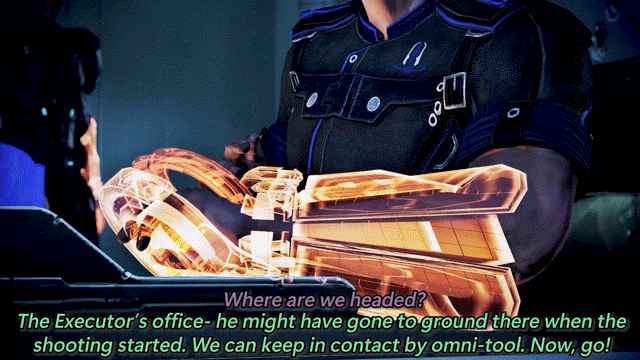









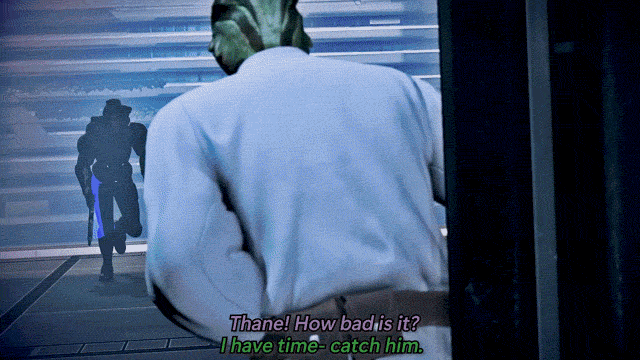
THE BEST OF PRIORITY: THE CITADEL (PART 1)
Featuring: Cmdr. Sophie Shepard, Lt. James Vega, EDI, and Thane Krios With: Flight Lt. Jeff "Joker" Moreau, Councilor Rannadril Bibsos Tembin Lesti Bensin Valern, Cmdr. Armando-Owen Bailey, and Kai Leng Kalahira, this one's heart is pure, but beset by wickedness and contention. Guide this one to where the traveler never tires, the lover never leaves, the hungry never starve. Guide this one, Kalahira, and she will be a companion to you as she was to me. Mass Effect 3: Legendary Edition (2021)
#mira makes gifs ✨#sophie shepard#james vega#EDI#thane krios#jeff joker moreau#mass effect#mass effect 3#me3#mass effect legendary edition#dailygaming#priority citadel is one of my favorite priority missions in the game so it’s a fun one to gif!#i absolutely love how much thane content you get in the front end of the mission since thane is one of my favorites!#and bailey is one of my favorite npcs in the game so i adore that he gets a bit of a spotlight role in a bigger mission too!#but i will say that i do think priority citadel has some.. writing issues? to put it mildly?#i think my biggest problem is that i feel like everything with udina feels like it kinda just comes out of left field#like it feels like there’s VERY little build up for what happens with udina being a cerberus plant#the idea is interesting!! but i wish there was much more build up for it? it’s sort of just- there for me and it just comes at you so fast#like udina had always been sort of portrayed as a kind of shifty/power hungry character (don’t get me wrong)#but the cerberus plot line seemed VERY hastily thrown in and i wish there was a bit more subtle nodding to it throughout earlier missions#and i could write essays about how i wish kai leng was written better#but people who write much more eloquently than i do can put it in much better words than i can what problems there are with his writing#i think he had potential to be a super interesting character if he was introduced earlier and was much less stereotypical in form#also i’m sorry mr. leng but miranda wears the armor better (I SAID IT AND I WONT APOLOGIZE FOR IT)#the fight between kai leng and thane is *chef’s kiss* 👌 tho (i adore the cinematography of the shots as a video editing bitch)#ME3 has very nice fight choreography in some of the cutscenes (especially the ones with kai leng and the phantoms)#thane krios will always be my beloved and in canon he and soph develop a mutual respect over their hand to hand combat skills :)#also i forgot to say joker looking so absolutely done with everything in that first gif is me irl ✨
17 notes
·
View notes
Text
youtube
N7 Day 2023 Teaser!
Still a little insubstantial of a teaser, but at least some new fuel for the fire... Cool looking assassin/infiltrator type outfit though.
I'm still surprised how many folks keep chanting "Liara! Liara!!" just because.... it's a woman? I mean, N7 logo and a helmet that doesn't look like it has room for asari fringe, but, sure, Liara...

I personally hope this is our first glimpse at some badass new protagonist character, much less in the vein of someone like Ryder, and more in the vein of some seasoned professional who's seen-some-shit™ like Shepard.
Someone joked that this would be Mass Effect's version of the Inquisitor and.... I'm actually kind of okay with that if that's the case, lol.
#mass effect#epsilon#N7 Day#bioware#teaser#if it IS Liara I will gag#she's been in enough#give someone else the spotlight I BEG#Youtube
24 notes
·
View notes
Text
Sorry for being late today coming online, a lot has happened and I am trying to think about the best way to organize this blog going forward. For now though I will try to get the list updated quickly and read through my messages/@'s
#meg talks#mainly thinking about how best to spotlight people's fundraisers because so many are gaining and losing traction periodically#and some of my posts seem to get more reach than others#mostly what troubles me is i think that the more campaigns i boost the less effective it is for each campaign#i think that the small batches of donation matching campaigns that i organized with other people was the most effective thing so far#bc it guaranteed at least one donation to each campaign#i think i'm going to try to make other small batch posts too each day#like ''here are some campaigns that are close to their goal/low on funds/almost to the halfway mark or some other milestone/etc''#but idk. i just feel troubled and i think some people who have reached out to me think i have more reach than i actually do#i have less than 3k followers and a lot of them are inactive blogs from over the past ten years#ofc that still isn't nothing and im going to keep doing what im doing but im afraid people might be reaching out to me#thinking that i'll be able to give their campaigns more visibility than i actually can#im grateful that my master list has gotten some traction but the longer it gets the tougher it is to single ppl out#i don't know. if people have suggestions please let me know#for now i would really really appreciate volunteers to help w the donation matching campaigns#if i can have ppl committing to donating like 5 bucks to a handful of campaigns once or twice a month#then at least that's something that IS guaranteed u know... though i feel ashamed that i quit my job#and can't guarantee much myself until i find a new one#idk im just troubled and i'm not going to stop boosting campaigns but i hate the thought of getting ppl's hopes up and not delivering
7 notes
·
View notes
Text
Look I'm not a fan of the BNHA dub. I think it was done badly and there's a lot of voices I don't like in it. That being said, I do think it's hilarious that the dub added their own original line in the Sports Festival that was
Hizashi: AND THERE YOU HAVE IT FOLKS! ERASERHEAD IS A TERRIBLE TEACHER!
Aizawa: I'M WHAT
They understood the Hizashi assignment better than most of this fandom's fics of him. Because of the two of them, Hizashi is the feral one with heavy biases in his commentary. He makes a snide joke about how quirks that aren't flashy aren't popular and takes a jab at Aizawa about it [he's right], has to be reminded by Aizawa that he's not meant to take sides as the commentator and gets elbowed in the face when he's like "wow they're talking a lotta shit about Bakugou! And honestly I kinda agree with that they're saying"
Hizashi has never given a single fuck in his life and knows exactly how to engage an audience in his performance. Let us also not forget that when he asked if he could beat up all those reporters, Aizawa stops him by reminding him that doing so would get his name smeared through the dirt
#bnha#yamada hizashi#aizawa shouta#not to be deranged about it but aizawa never cared for being in the spotlight#and so has no reason to care about what people say about him#but he does care about what happens to hizashi's name because hizashi *is* in the centre of the limelight#and whatever is said about him will have massive effects on his career#and I just think it's really touching and sweet that aizawa cares enough about hizashi's public name to go 'hey. lets not'#they're in love your honour
52 notes
·
View notes
Text

Green-Eyed Punisher
#enstars#ensemble stars#madara mikejima#art#did my friend's one layer challenge and decided to color it#learned a lot tbh#but i wanna learn more#inspired by gumnem's orv novel art#i might redo this sometime#me likey the spotlight effect ngl
16 notes
·
View notes
Text

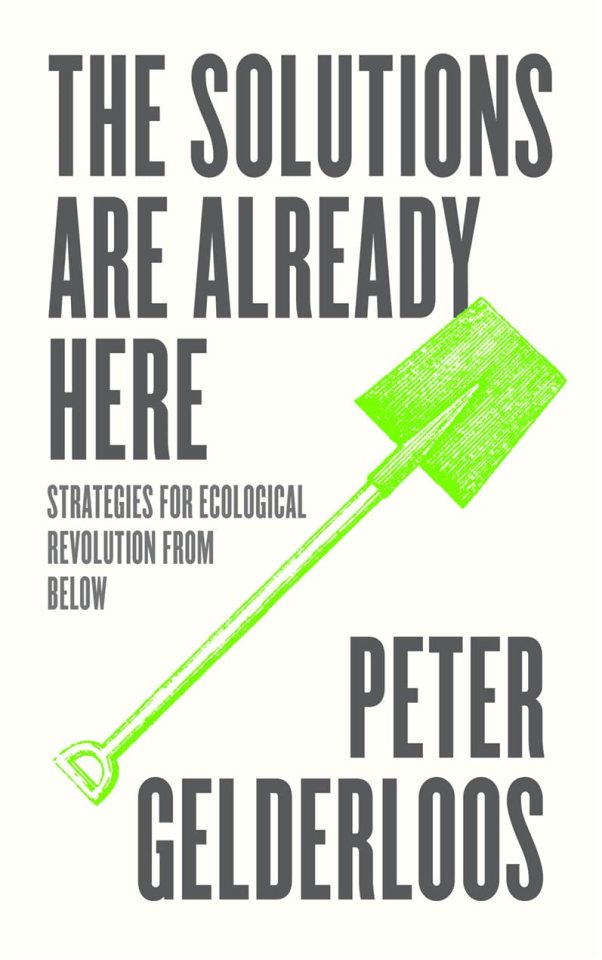
Currently reading
#Currently reading#been a while since I did a reading update#'Gardens of the Moon' had fascinating worldbuilding but I found it difficult to read/follow#'Mass Effect: Annihilation' was great - loved seeing non-Council aliens taking the spotlight#poor Perturabo (Hammer of Olympia) someone give that primarch a hug#It was good to see more exploring of Navigator houses in 'Rites of Passage' but it felt too generic (especially for 40k)#'Legends & Lattes' was adorable and cosy and heartwarming 'nuff said#'An Unnatural Life' was interesting! I wish it was longer#'The Dawn of Everything' was a blast and an absolute must-read#'Spark of Revolution' was also great - love an abhuman revolution against workplace tyranny!
46 notes
·
View notes